Literature Review: Nurses' Attitudes in Substance Misuse Support
VerifiedAdded on 2022/08/14
|33
|9175
|25
Literature Review
AI Summary
This literature review investigates nurses' attitudes towards supporting clients with substance misuse, a critical area given the increasing prevalence of substance abuse. The review defines substance misuse and highlights its detrimental effects on individuals' physical and mental health, as well as its social consequences. It examines the role of nurses in identifying and addressing substance abuse, emphasizing the importance of early intervention and positive nurse-patient interactions. The review explores historical and contemporary attitudes, noting both negative biases and the need for improved training and support for nurses. The literature review synthesizes research from various databases, including CINAHL, PSYCINFO, PUBMED, and Google Scholar, analyzing articles to determine the impact of nurses' attitudes on patient care, treatment access, and outcomes. The review also addresses the barriers to effective care, such as a lack of resources, training, and staff, and explores the importance of understanding nurses' attitudes to improve patient outcomes. The review concludes by emphasizing the need for further research to understand how healthcare professionals' attitudes impact patient outcomes.
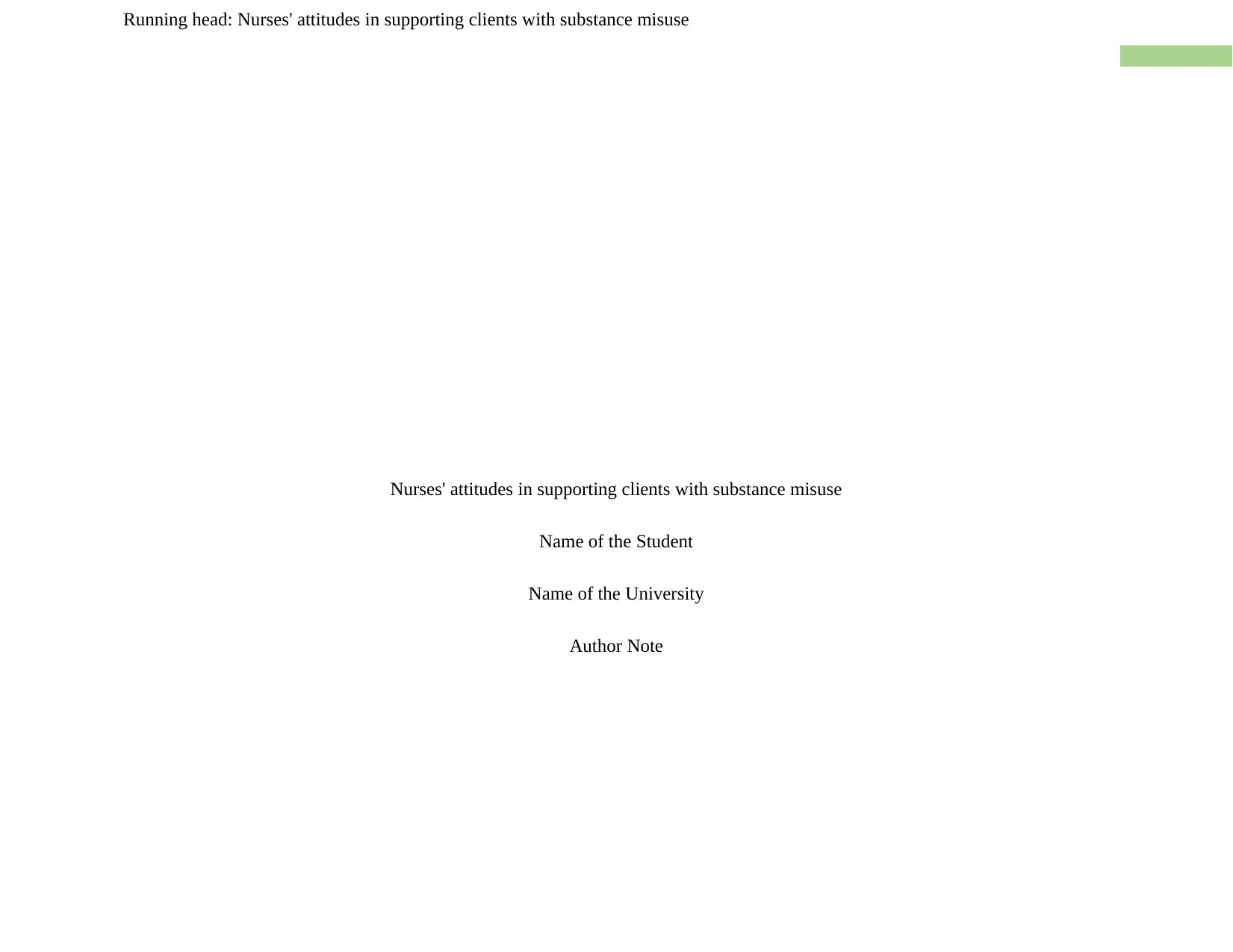
Running head: Nurses' attitudes in supporting clients with substance misuse
Nurses' attitudes in supporting clients with substance misuse
Name of the Student
Name of the University
Author Note
Nurses' attitudes in supporting clients with substance misuse
Name of the Student
Name of the University
Author Note
Paraphrase This Document
Need a fresh take? Get an instant paraphrase of this document with our AI Paraphraser
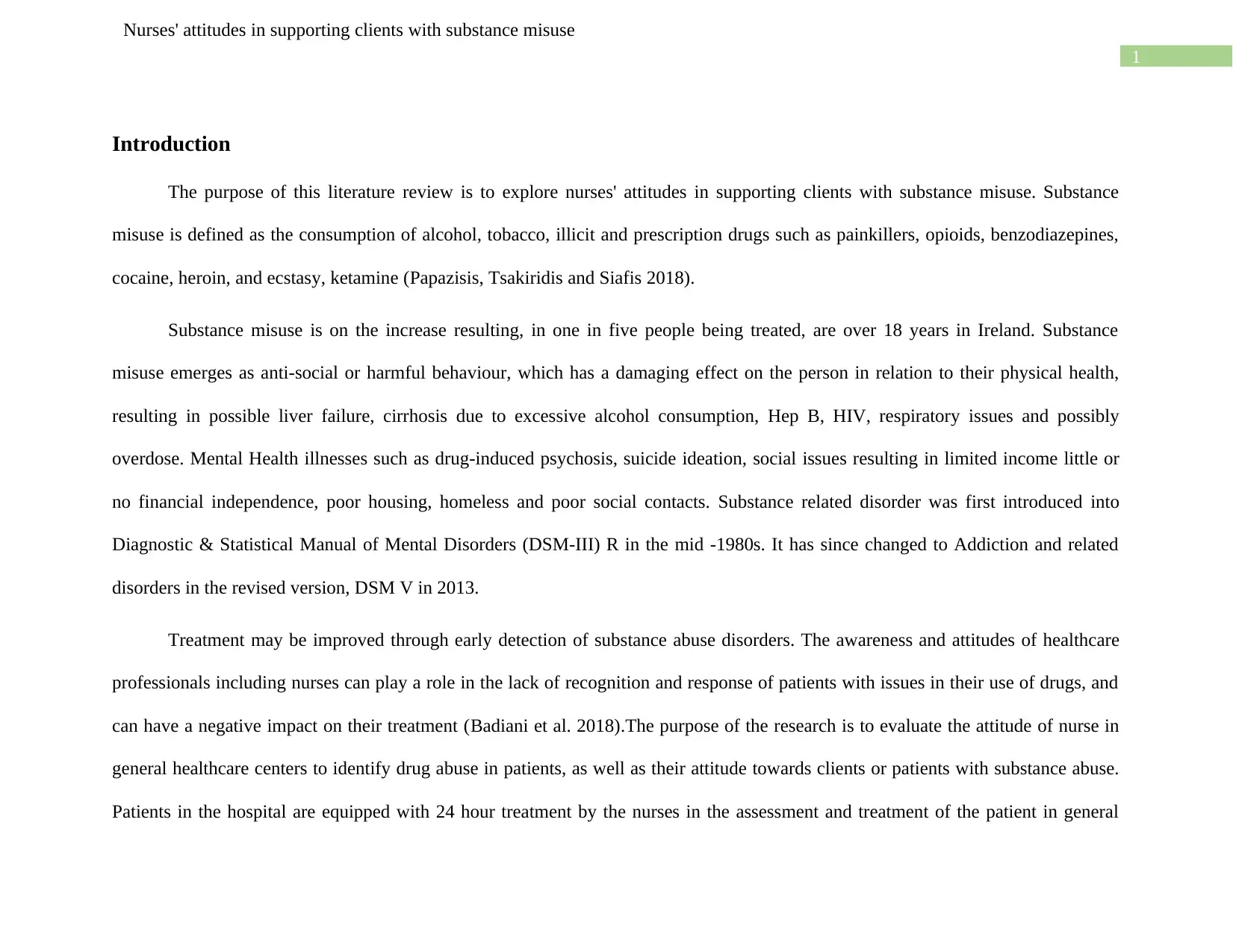
1
Nurses' attitudes in supporting clients with substance misuse
Introduction
The purpose of this literature review is to explore nurses' attitudes in supporting clients with substance misuse. Substance
misuse is defined as the consumption of alcohol, tobacco, illicit and prescription drugs such as painkillers, opioids, benzodiazepines,
cocaine, heroin, and ecstasy, ketamine (Papazisis, Tsakiridis and Siafis 2018).
Substance misuse is on the increase resulting, in one in five people being treated, are over 18 years in Ireland. Substance
misuse emerges as anti-social or harmful behaviour, which has a damaging effect on the person in relation to their physical health,
resulting in possible liver failure, cirrhosis due to excessive alcohol consumption, Hep B, HIV, respiratory issues and possibly
overdose. Mental Health illnesses such as drug-induced psychosis, suicide ideation, social issues resulting in limited income little or
no financial independence, poor housing, homeless and poor social contacts. Substance related disorder was first introduced into
Diagnostic & Statistical Manual of Mental Disorders (DSM-III) R in the mid -1980s. It has since changed to Addiction and related
disorders in the revised version, DSM V in 2013.
Treatment may be improved through early detection of substance abuse disorders. The awareness and attitudes of healthcare
professionals including nurses can play a role in the lack of recognition and response of patients with issues in their use of drugs, and
can have a negative impact on their treatment (Badiani et al. 2018).The purpose of the research is to evaluate the attitude of nurse in
general healthcare centers to identify drug abuse in patients, as well as their attitude towards clients or patients with substance abuse.
Patients in the hospital are equipped with 24 hour treatment by the nurses in the assessment and treatment of the patient in general
Nurses' attitudes in supporting clients with substance misuse
Introduction
The purpose of this literature review is to explore nurses' attitudes in supporting clients with substance misuse. Substance
misuse is defined as the consumption of alcohol, tobacco, illicit and prescription drugs such as painkillers, opioids, benzodiazepines,
cocaine, heroin, and ecstasy, ketamine (Papazisis, Tsakiridis and Siafis 2018).
Substance misuse is on the increase resulting, in one in five people being treated, are over 18 years in Ireland. Substance
misuse emerges as anti-social or harmful behaviour, which has a damaging effect on the person in relation to their physical health,
resulting in possible liver failure, cirrhosis due to excessive alcohol consumption, Hep B, HIV, respiratory issues and possibly
overdose. Mental Health illnesses such as drug-induced psychosis, suicide ideation, social issues resulting in limited income little or
no financial independence, poor housing, homeless and poor social contacts. Substance related disorder was first introduced into
Diagnostic & Statistical Manual of Mental Disorders (DSM-III) R in the mid -1980s. It has since changed to Addiction and related
disorders in the revised version, DSM V in 2013.
Treatment may be improved through early detection of substance abuse disorders. The awareness and attitudes of healthcare
professionals including nurses can play a role in the lack of recognition and response of patients with issues in their use of drugs, and
can have a negative impact on their treatment (Badiani et al. 2018).The purpose of the research is to evaluate the attitude of nurse in
general healthcare centers to identify drug abuse in patients, as well as their attitude towards clients or patients with substance abuse.
Patients in the hospital are equipped with 24 hour treatment by the nurses in the assessment and treatment of the patient in general
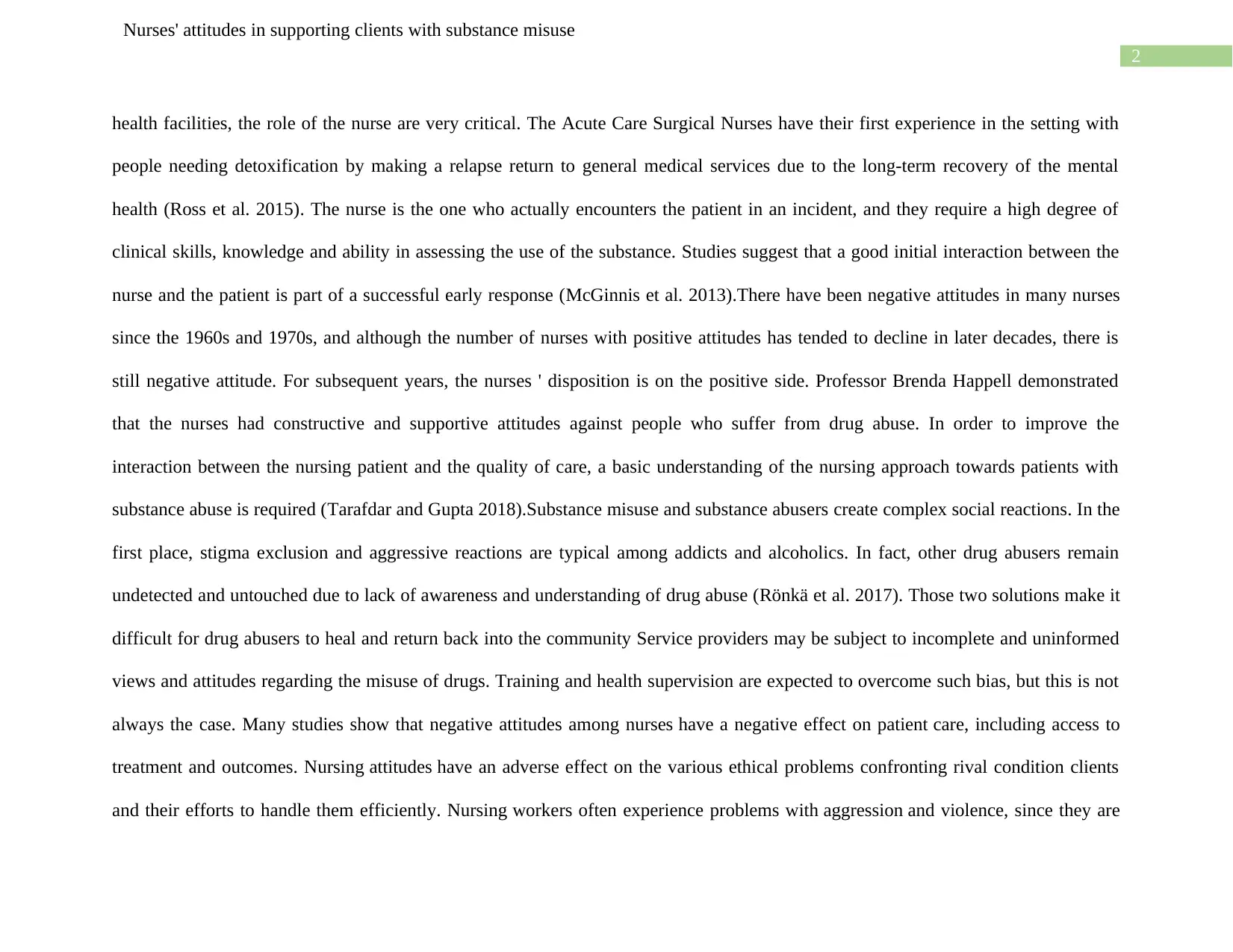
2
Nurses' attitudes in supporting clients with substance misuse
health facilities, the role of the nurse are very critical. The Acute Care Surgical Nurses have their first experience in the setting with
people needing detoxification by making a relapse return to general medical services due to the long-term recovery of the mental
health (Ross et al. 2015). The nurse is the one who actually encounters the patient in an incident, and they require a high degree of
clinical skills, knowledge and ability in assessing the use of the substance. Studies suggest that a good initial interaction between the
nurse and the patient is part of a successful early response (McGinnis et al. 2013).There have been negative attitudes in many nurses
since the 1960s and 1970s, and although the number of nurses with positive attitudes has tended to decline in later decades, there is
still negative attitude. For subsequent years, the nurses ' disposition is on the positive side. Professor Brenda Happell demonstrated
that the nurses had constructive and supportive attitudes against people who suffer from drug abuse. In order to improve the
interaction between the nursing patient and the quality of care, a basic understanding of the nursing approach towards patients with
substance abuse is required (Tarafdar and Gupta 2018).Substance misuse and substance abusers create complex social reactions. In the
first place, stigma exclusion and aggressive reactions are typical among addicts and alcoholics. In fact, other drug abusers remain
undetected and untouched due to lack of awareness and understanding of drug abuse (Rönkä et al. 2017). Those two solutions make it
difficult for drug abusers to heal and return back into the community Service providers may be subject to incomplete and uninformed
views and attitudes regarding the misuse of drugs. Training and health supervision are expected to overcome such bias, but this is not
always the case. Many studies show that negative attitudes among nurses have a negative effect on patient care, including access to
treatment and outcomes. Nursing attitudes have an adverse effect on the various ethical problems confronting rival condition clients
and their efforts to handle them efficiently. Nursing workers often experience problems with aggression and violence, since they are
Nurses' attitudes in supporting clients with substance misuse
health facilities, the role of the nurse are very critical. The Acute Care Surgical Nurses have their first experience in the setting with
people needing detoxification by making a relapse return to general medical services due to the long-term recovery of the mental
health (Ross et al. 2015). The nurse is the one who actually encounters the patient in an incident, and they require a high degree of
clinical skills, knowledge and ability in assessing the use of the substance. Studies suggest that a good initial interaction between the
nurse and the patient is part of a successful early response (McGinnis et al. 2013).There have been negative attitudes in many nurses
since the 1960s and 1970s, and although the number of nurses with positive attitudes has tended to decline in later decades, there is
still negative attitude. For subsequent years, the nurses ' disposition is on the positive side. Professor Brenda Happell demonstrated
that the nurses had constructive and supportive attitudes against people who suffer from drug abuse. In order to improve the
interaction between the nursing patient and the quality of care, a basic understanding of the nursing approach towards patients with
substance abuse is required (Tarafdar and Gupta 2018).Substance misuse and substance abusers create complex social reactions. In the
first place, stigma exclusion and aggressive reactions are typical among addicts and alcoholics. In fact, other drug abusers remain
undetected and untouched due to lack of awareness and understanding of drug abuse (Rönkä et al. 2017). Those two solutions make it
difficult for drug abusers to heal and return back into the community Service providers may be subject to incomplete and uninformed
views and attitudes regarding the misuse of drugs. Training and health supervision are expected to overcome such bias, but this is not
always the case. Many studies show that negative attitudes among nurses have a negative effect on patient care, including access to
treatment and outcomes. Nursing attitudes have an adverse effect on the various ethical problems confronting rival condition clients
and their efforts to handle them efficiently. Nursing workers often experience problems with aggression and violence, since they are
⊘ This is a preview!⊘
Do you want full access?
Subscribe today to unlock all pages.

Trusted by 1+ million students worldwide
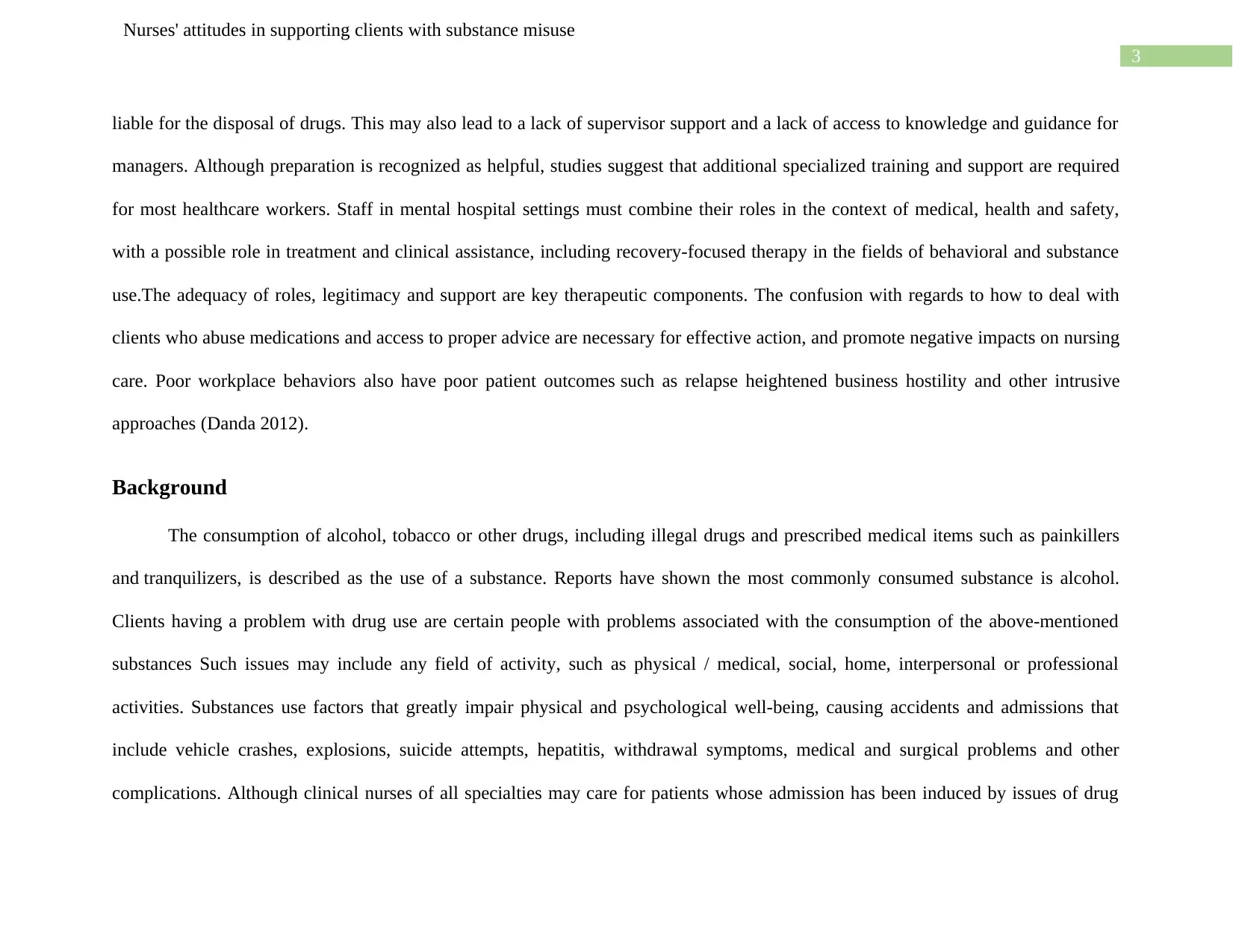
3
Nurses' attitudes in supporting clients with substance misuse
liable for the disposal of drugs. This may also lead to a lack of supervisor support and a lack of access to knowledge and guidance for
managers. Although preparation is recognized as helpful, studies suggest that additional specialized training and support are required
for most healthcare workers. Staff in mental hospital settings must combine their roles in the context of medical, health and safety,
with a possible role in treatment and clinical assistance, including recovery-focused therapy in the fields of behavioral and substance
use.The adequacy of roles, legitimacy and support are key therapeutic components. The confusion with regards to how to deal with
clients who abuse medications and access to proper advice are necessary for effective action, and promote negative impacts on nursing
care. Poor workplace behaviors also have poor patient outcomes such as relapse heightened business hostility and other intrusive
approaches (Danda 2012).
Background
The consumption of alcohol, tobacco or other drugs, including illegal drugs and prescribed medical items such as painkillers
and tranquilizers, is described as the use of a substance. Reports have shown the most commonly consumed substance is alcohol.
Clients having a problem with drug use are certain people with problems associated with the consumption of the above-mentioned
substances Such issues may include any field of activity, such as physical / medical, social, home, interpersonal or professional
activities. Substances use factors that greatly impair physical and psychological well-being, causing accidents and admissions that
include vehicle crashes, explosions, suicide attempts, hepatitis, withdrawal symptoms, medical and surgical problems and other
complications. Although clinical nurses of all specialties may care for patients whose admission has been induced by issues of drug
Nurses' attitudes in supporting clients with substance misuse
liable for the disposal of drugs. This may also lead to a lack of supervisor support and a lack of access to knowledge and guidance for
managers. Although preparation is recognized as helpful, studies suggest that additional specialized training and support are required
for most healthcare workers. Staff in mental hospital settings must combine their roles in the context of medical, health and safety,
with a possible role in treatment and clinical assistance, including recovery-focused therapy in the fields of behavioral and substance
use.The adequacy of roles, legitimacy and support are key therapeutic components. The confusion with regards to how to deal with
clients who abuse medications and access to proper advice are necessary for effective action, and promote negative impacts on nursing
care. Poor workplace behaviors also have poor patient outcomes such as relapse heightened business hostility and other intrusive
approaches (Danda 2012).
Background
The consumption of alcohol, tobacco or other drugs, including illegal drugs and prescribed medical items such as painkillers
and tranquilizers, is described as the use of a substance. Reports have shown the most commonly consumed substance is alcohol.
Clients having a problem with drug use are certain people with problems associated with the consumption of the above-mentioned
substances Such issues may include any field of activity, such as physical / medical, social, home, interpersonal or professional
activities. Substances use factors that greatly impair physical and psychological well-being, causing accidents and admissions that
include vehicle crashes, explosions, suicide attempts, hepatitis, withdrawal symptoms, medical and surgical problems and other
complications. Although clinical nurses of all specialties may care for patients whose admission has been induced by issues of drug
Paraphrase This Document
Need a fresh take? Get an instant paraphrase of this document with our AI Paraphraser
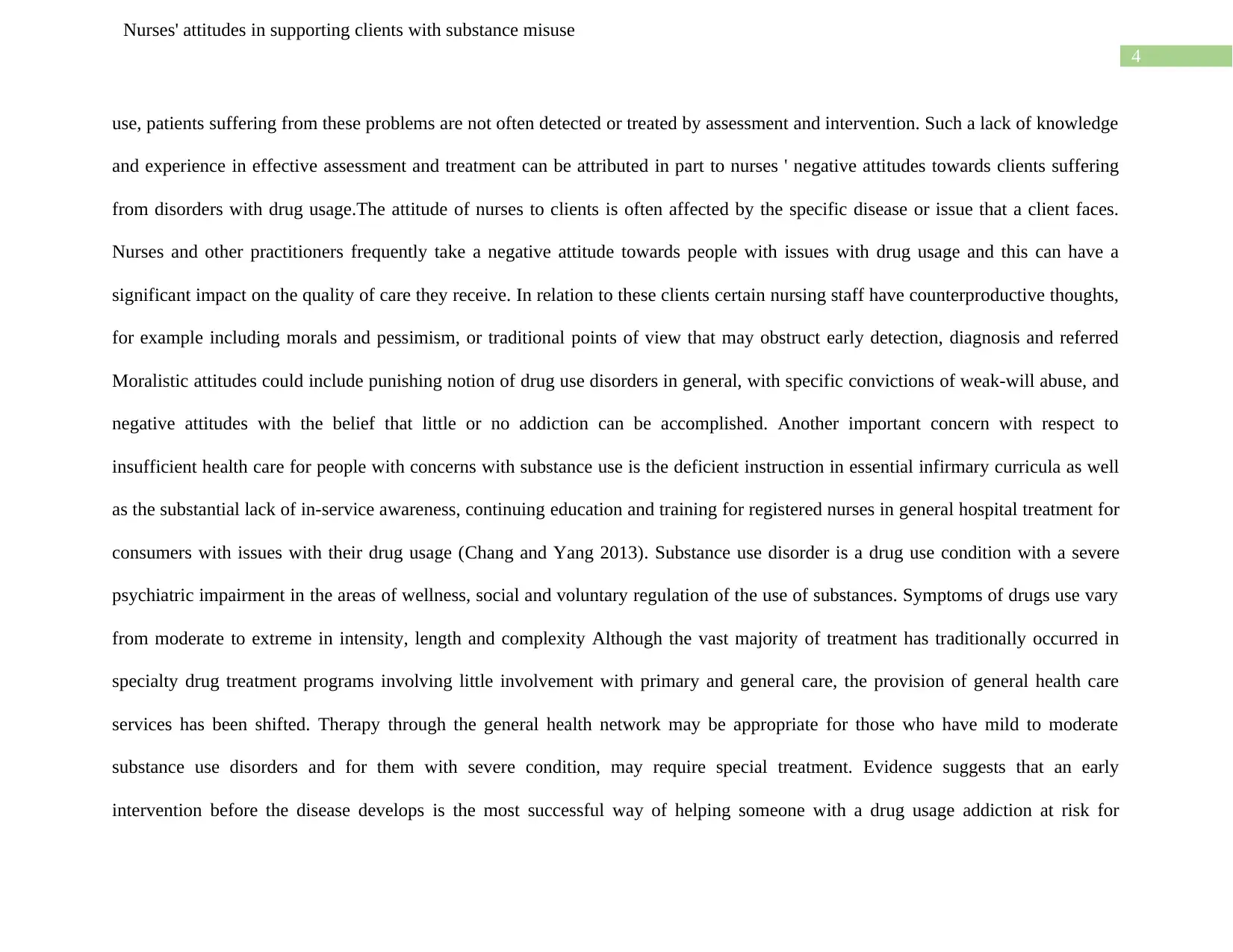
4
Nurses' attitudes in supporting clients with substance misuse
use, patients suffering from these problems are not often detected or treated by assessment and intervention. Such a lack of knowledge
and experience in effective assessment and treatment can be attributed in part to nurses ' negative attitudes towards clients suffering
from disorders with drug usage.The attitude of nurses to clients is often affected by the specific disease or issue that a client faces.
Nurses and other practitioners frequently take a negative attitude towards people with issues with drug usage and this can have a
significant impact on the quality of care they receive. In relation to these clients certain nursing staff have counterproductive thoughts,
for example including morals and pessimism, or traditional points of view that may obstruct early detection, diagnosis and referred
Moralistic attitudes could include punishing notion of drug use disorders in general, with specific convictions of weak-will abuse, and
negative attitudes with the belief that little or no addiction can be accomplished. Another important concern with respect to
insufficient health care for people with concerns with substance use is the deficient instruction in essential infirmary curricula as well
as the substantial lack of in-service awareness, continuing education and training for registered nurses in general hospital treatment for
consumers with issues with their drug usage (Chang and Yang 2013). Substance use disorder is a drug use condition with a severe
psychiatric impairment in the areas of wellness, social and voluntary regulation of the use of substances. Symptoms of drugs use vary
from moderate to extreme in intensity, length and complexity Although the vast majority of treatment has traditionally occurred in
specialty drug treatment programs involving little involvement with primary and general care, the provision of general health care
services has been shifted. Therapy through the general health network may be appropriate for those who have mild to moderate
substance use disorders and for them with severe condition, may require special treatment. Evidence suggests that an early
intervention before the disease develops is the most successful way of helping someone with a drug usage addiction at risk for
Nurses' attitudes in supporting clients with substance misuse
use, patients suffering from these problems are not often detected or treated by assessment and intervention. Such a lack of knowledge
and experience in effective assessment and treatment can be attributed in part to nurses ' negative attitudes towards clients suffering
from disorders with drug usage.The attitude of nurses to clients is often affected by the specific disease or issue that a client faces.
Nurses and other practitioners frequently take a negative attitude towards people with issues with drug usage and this can have a
significant impact on the quality of care they receive. In relation to these clients certain nursing staff have counterproductive thoughts,
for example including morals and pessimism, or traditional points of view that may obstruct early detection, diagnosis and referred
Moralistic attitudes could include punishing notion of drug use disorders in general, with specific convictions of weak-will abuse, and
negative attitudes with the belief that little or no addiction can be accomplished. Another important concern with respect to
insufficient health care for people with concerns with substance use is the deficient instruction in essential infirmary curricula as well
as the substantial lack of in-service awareness, continuing education and training for registered nurses in general hospital treatment for
consumers with issues with their drug usage (Chang and Yang 2013). Substance use disorder is a drug use condition with a severe
psychiatric impairment in the areas of wellness, social and voluntary regulation of the use of substances. Symptoms of drugs use vary
from moderate to extreme in intensity, length and complexity Although the vast majority of treatment has traditionally occurred in
specialty drug treatment programs involving little involvement with primary and general care, the provision of general health care
services has been shifted. Therapy through the general health network may be appropriate for those who have mild to moderate
substance use disorders and for them with severe condition, may require special treatment. Evidence suggests that an early
intervention before the disease develops is the most successful way of helping someone with a drug usage addiction at risk for
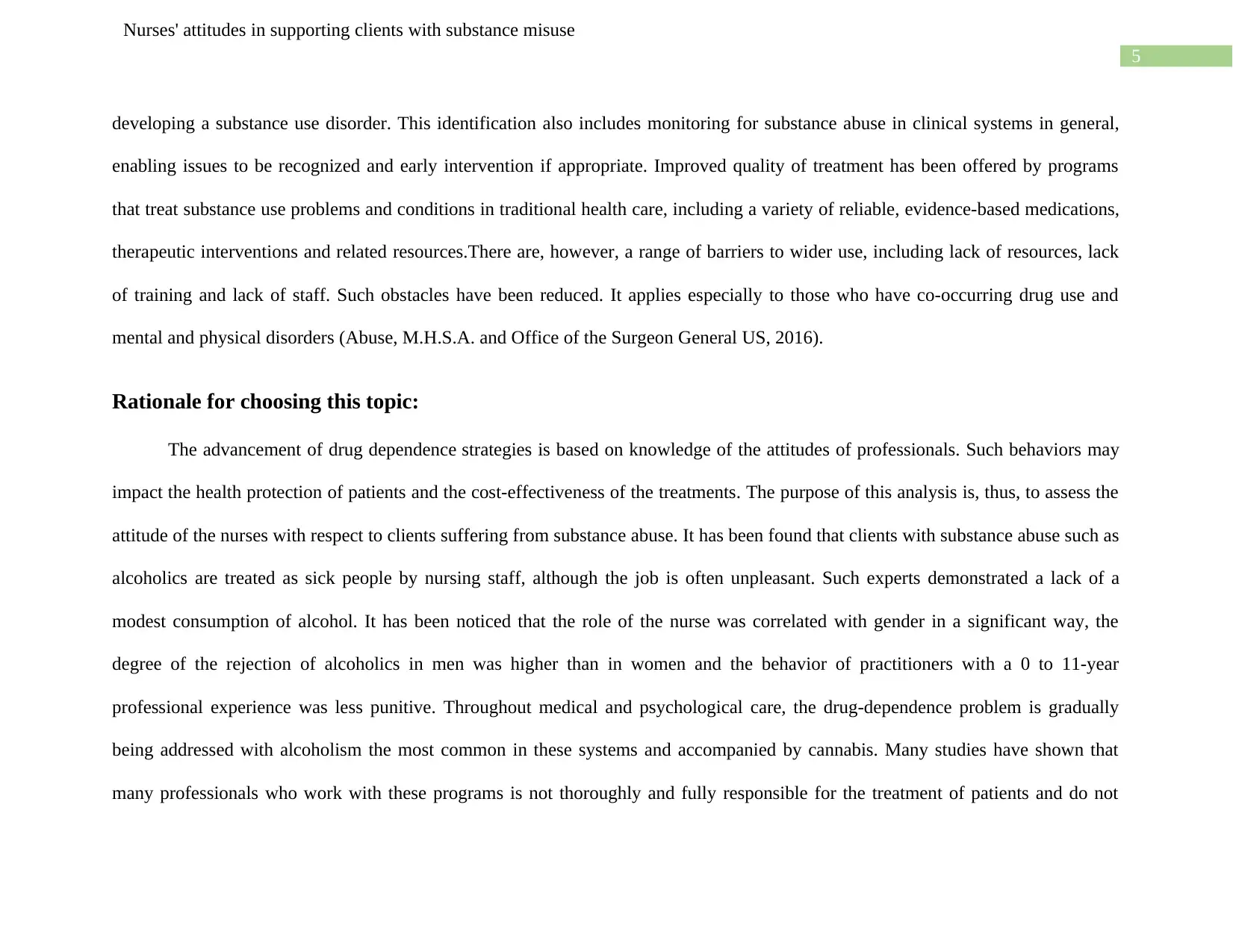
5
Nurses' attitudes in supporting clients with substance misuse
developing a substance use disorder. This identification also includes monitoring for substance abuse in clinical systems in general,
enabling issues to be recognized and early intervention if appropriate. Improved quality of treatment has been offered by programs
that treat substance use problems and conditions in traditional health care, including a variety of reliable, evidence-based medications,
therapeutic interventions and related resources.There are, however, a range of barriers to wider use, including lack of resources, lack
of training and lack of staff. Such obstacles have been reduced. It applies especially to those who have co-occurring drug use and
mental and physical disorders (Abuse, M.H.S.A. and Office of the Surgeon General US, 2016).
Rationale for choosing this topic:
The advancement of drug dependence strategies is based on knowledge of the attitudes of professionals. Such behaviors may
impact the health protection of patients and the cost-effectiveness of the treatments. The purpose of this analysis is, thus, to assess the
attitude of the nurses with respect to clients suffering from substance abuse. It has been found that clients with substance abuse such as
alcoholics are treated as sick people by nursing staff, although the job is often unpleasant. Such experts demonstrated a lack of a
modest consumption of alcohol. It has been noticed that the role of the nurse was correlated with gender in a significant way, the
degree of the rejection of alcoholics in men was higher than in women and the behavior of practitioners with a 0 to 11-year
professional experience was less punitive. Throughout medical and psychological care, the drug-dependence problem is gradually
being addressed with alcoholism the most common in these systems and accompanied by cannabis. Many studies have shown that
many professionals who work with these programs is not thoroughly and fully responsible for the treatment of patients and do not
Nurses' attitudes in supporting clients with substance misuse
developing a substance use disorder. This identification also includes monitoring for substance abuse in clinical systems in general,
enabling issues to be recognized and early intervention if appropriate. Improved quality of treatment has been offered by programs
that treat substance use problems and conditions in traditional health care, including a variety of reliable, evidence-based medications,
therapeutic interventions and related resources.There are, however, a range of barriers to wider use, including lack of resources, lack
of training and lack of staff. Such obstacles have been reduced. It applies especially to those who have co-occurring drug use and
mental and physical disorders (Abuse, M.H.S.A. and Office of the Surgeon General US, 2016).
Rationale for choosing this topic:
The advancement of drug dependence strategies is based on knowledge of the attitudes of professionals. Such behaviors may
impact the health protection of patients and the cost-effectiveness of the treatments. The purpose of this analysis is, thus, to assess the
attitude of the nurses with respect to clients suffering from substance abuse. It has been found that clients with substance abuse such as
alcoholics are treated as sick people by nursing staff, although the job is often unpleasant. Such experts demonstrated a lack of a
modest consumption of alcohol. It has been noticed that the role of the nurse was correlated with gender in a significant way, the
degree of the rejection of alcoholics in men was higher than in women and the behavior of practitioners with a 0 to 11-year
professional experience was less punitive. Throughout medical and psychological care, the drug-dependence problem is gradually
being addressed with alcoholism the most common in these systems and accompanied by cannabis. Many studies have shown that
many professionals who work with these programs is not thoroughly and fully responsible for the treatment of patients and do not
⊘ This is a preview!⊘
Do you want full access?
Subscribe today to unlock all pages.

Trusted by 1+ million students worldwide
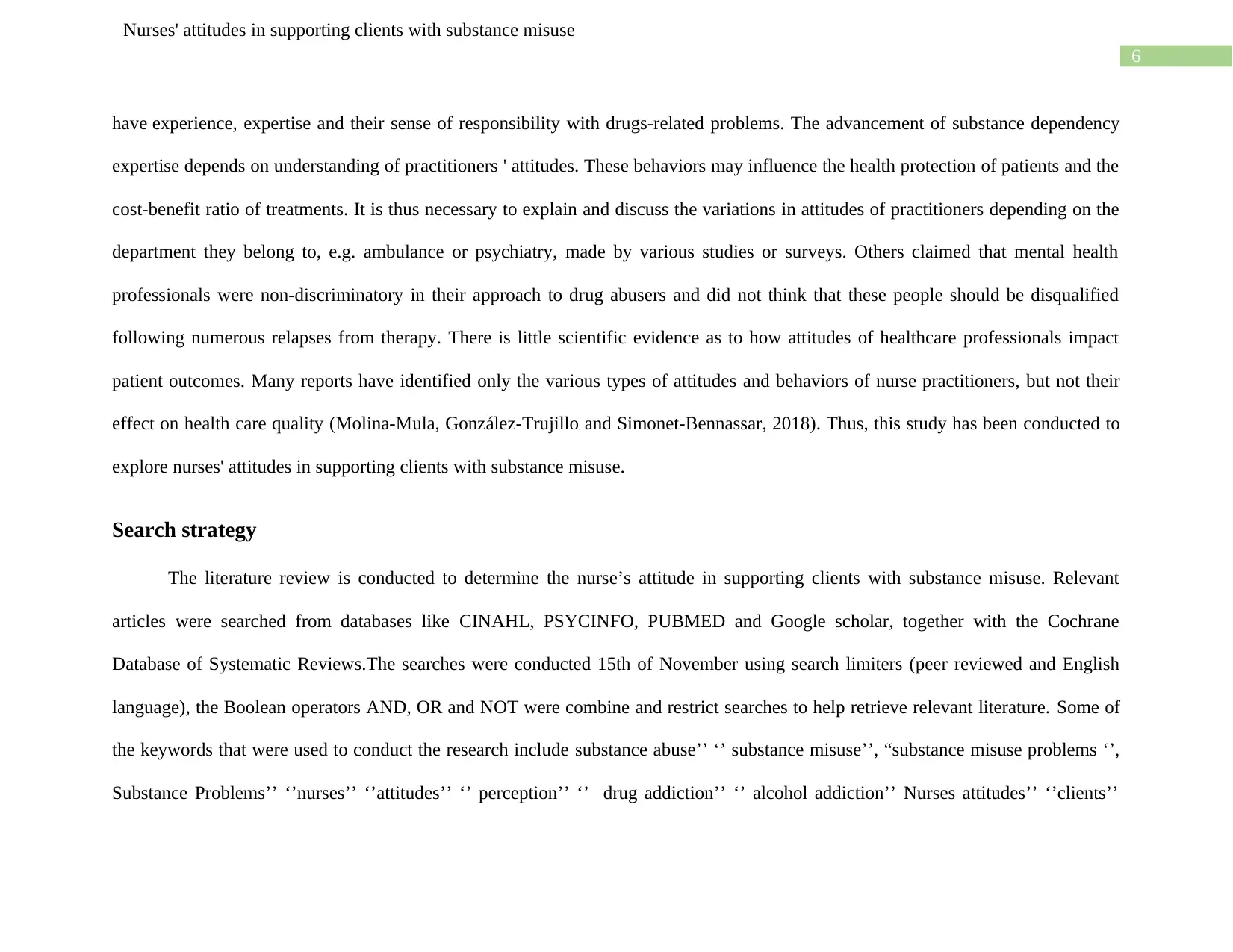
6
Nurses' attitudes in supporting clients with substance misuse
have experience, expertise and their sense of responsibility with drugs-related problems. The advancement of substance dependency
expertise depends on understanding of practitioners ' attitudes. These behaviors may influence the health protection of patients and the
cost-benefit ratio of treatments. It is thus necessary to explain and discuss the variations in attitudes of practitioners depending on the
department they belong to, e.g. ambulance or psychiatry, made by various studies or surveys. Others claimed that mental health
professionals were non-discriminatory in their approach to drug abusers and did not think that these people should be disqualified
following numerous relapses from therapy. There is little scientific evidence as to how attitudes of healthcare professionals impact
patient outcomes. Many reports have identified only the various types of attitudes and behaviors of nurse practitioners, but not their
effect on health care quality (Molina-Mula, González-Trujillo and Simonet-Bennassar, 2018). Thus, this study has been conducted to
explore nurses' attitudes in supporting clients with substance misuse.
Search strategy
The literature review is conducted to determine the nurse’s attitude in supporting clients with substance misuse. Relevant
articles were searched from databases like CINAHL, PSYCINFO, PUBMED and Google scholar, together with the Cochrane
Database of Systematic Reviews.The searches were conducted 15th of November using search limiters (peer reviewed and English
language), the Boolean operators AND, OR and NOT were combine and restrict searches to help retrieve relevant literature. Some of
the keywords that were used to conduct the research include substance abuse’’ ‘’ substance misuse’’, “substance misuse problems ‘’,
Substance Problems’’ ‘’nurses’’ ‘’attitudes’’ ‘’ perception’’ ‘’ drug addiction’’ ‘’ alcohol addiction’’ Nurses attitudes’’ ‘’clients’’
Nurses' attitudes in supporting clients with substance misuse
have experience, expertise and their sense of responsibility with drugs-related problems. The advancement of substance dependency
expertise depends on understanding of practitioners ' attitudes. These behaviors may influence the health protection of patients and the
cost-benefit ratio of treatments. It is thus necessary to explain and discuss the variations in attitudes of practitioners depending on the
department they belong to, e.g. ambulance or psychiatry, made by various studies or surveys. Others claimed that mental health
professionals were non-discriminatory in their approach to drug abusers and did not think that these people should be disqualified
following numerous relapses from therapy. There is little scientific evidence as to how attitudes of healthcare professionals impact
patient outcomes. Many reports have identified only the various types of attitudes and behaviors of nurse practitioners, but not their
effect on health care quality (Molina-Mula, González-Trujillo and Simonet-Bennassar, 2018). Thus, this study has been conducted to
explore nurses' attitudes in supporting clients with substance misuse.
Search strategy
The literature review is conducted to determine the nurse’s attitude in supporting clients with substance misuse. Relevant
articles were searched from databases like CINAHL, PSYCINFO, PUBMED and Google scholar, together with the Cochrane
Database of Systematic Reviews.The searches were conducted 15th of November using search limiters (peer reviewed and English
language), the Boolean operators AND, OR and NOT were combine and restrict searches to help retrieve relevant literature. Some of
the keywords that were used to conduct the research include substance abuse’’ ‘’ substance misuse’’, “substance misuse problems ‘’,
Substance Problems’’ ‘’nurses’’ ‘’attitudes’’ ‘’ perception’’ ‘’ drug addiction’’ ‘’ alcohol addiction’’ Nurses attitudes’’ ‘’clients’’
Paraphrase This Document
Need a fresh take? Get an instant paraphrase of this document with our AI Paraphraser
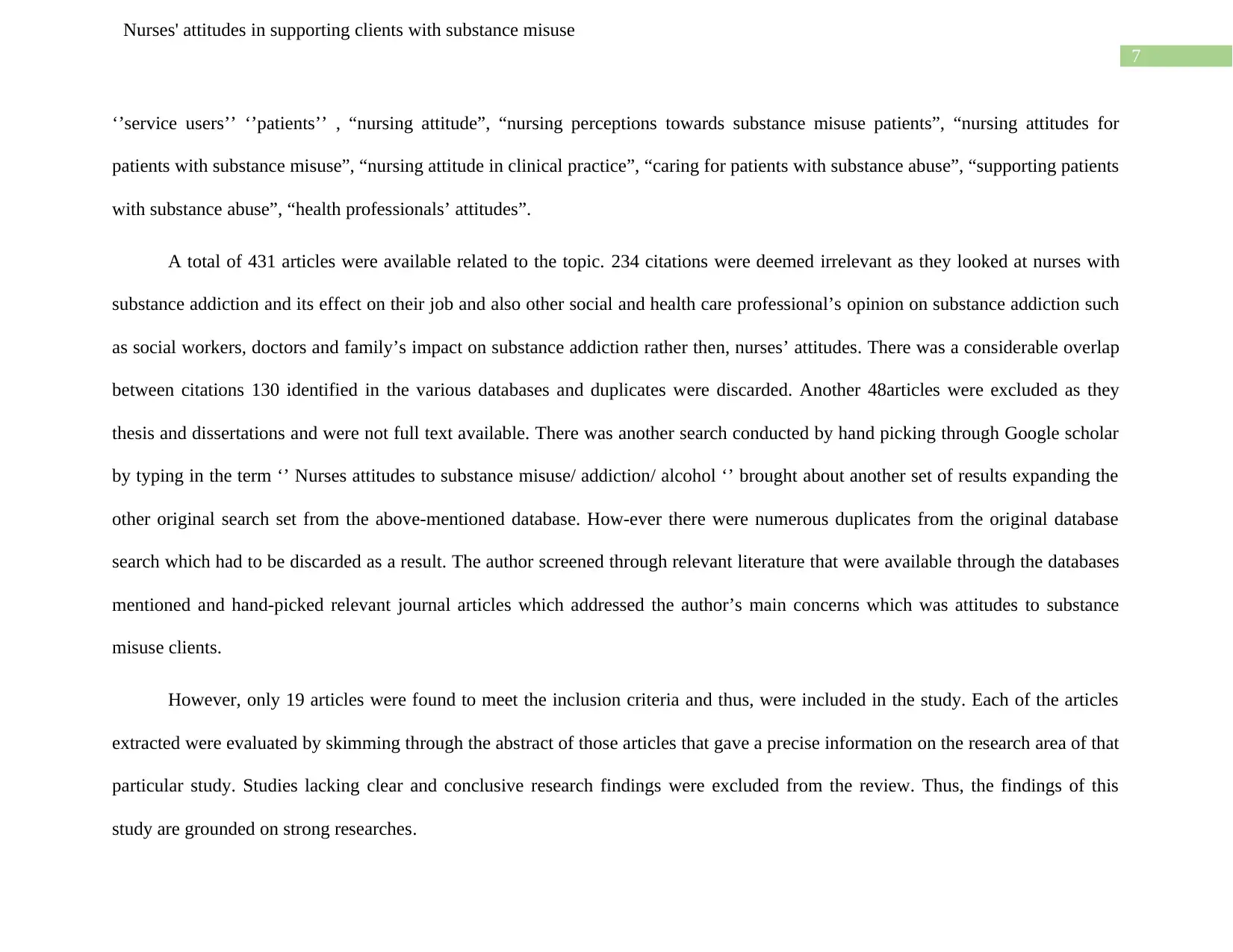
7
Nurses' attitudes in supporting clients with substance misuse
‘’service users’’ ‘’patients’’ , “nursing attitude”, “nursing perceptions towards substance misuse patients”, “nursing attitudes for
patients with substance misuse”, “nursing attitude in clinical practice”, “caring for patients with substance abuse”, “supporting patients
with substance abuse”, “health professionals’ attitudes”.
A total of 431 articles were available related to the topic. 234 citations were deemed irrelevant as they looked at nurses with
substance addiction and its effect on their job and also other social and health care professional’s opinion on substance addiction such
as social workers, doctors and family’s impact on substance addiction rather then, nurses’ attitudes. There was a considerable overlap
between citations 130 identified in the various databases and duplicates were discarded. Another 48articles were excluded as they
thesis and dissertations and were not full text available. There was another search conducted by hand picking through Google scholar
by typing in the term ‘’ Nurses attitudes to substance misuse/ addiction/ alcohol ‘’ brought about another set of results expanding the
other original search set from the above-mentioned database. How-ever there were numerous duplicates from the original database
search which had to be discarded as a result. The author screened through relevant literature that were available through the databases
mentioned and hand-picked relevant journal articles which addressed the author’s main concerns which was attitudes to substance
misuse clients.
However, only 19 articles were found to meet the inclusion criteria and thus, were included in the study. Each of the articles
extracted were evaluated by skimming through the abstract of those articles that gave a precise information on the research area of that
particular study. Studies lacking clear and conclusive research findings were excluded from the review. Thus, the findings of this
study are grounded on strong researches.
Nurses' attitudes in supporting clients with substance misuse
‘’service users’’ ‘’patients’’ , “nursing attitude”, “nursing perceptions towards substance misuse patients”, “nursing attitudes for
patients with substance misuse”, “nursing attitude in clinical practice”, “caring for patients with substance abuse”, “supporting patients
with substance abuse”, “health professionals’ attitudes”.
A total of 431 articles were available related to the topic. 234 citations were deemed irrelevant as they looked at nurses with
substance addiction and its effect on their job and also other social and health care professional’s opinion on substance addiction such
as social workers, doctors and family’s impact on substance addiction rather then, nurses’ attitudes. There was a considerable overlap
between citations 130 identified in the various databases and duplicates were discarded. Another 48articles were excluded as they
thesis and dissertations and were not full text available. There was another search conducted by hand picking through Google scholar
by typing in the term ‘’ Nurses attitudes to substance misuse/ addiction/ alcohol ‘’ brought about another set of results expanding the
other original search set from the above-mentioned database. How-ever there were numerous duplicates from the original database
search which had to be discarded as a result. The author screened through relevant literature that were available through the databases
mentioned and hand-picked relevant journal articles which addressed the author’s main concerns which was attitudes to substance
misuse clients.
However, only 19 articles were found to meet the inclusion criteria and thus, were included in the study. Each of the articles
extracted were evaluated by skimming through the abstract of those articles that gave a precise information on the research area of that
particular study. Studies lacking clear and conclusive research findings were excluded from the review. Thus, the findings of this
study are grounded on strong researches.
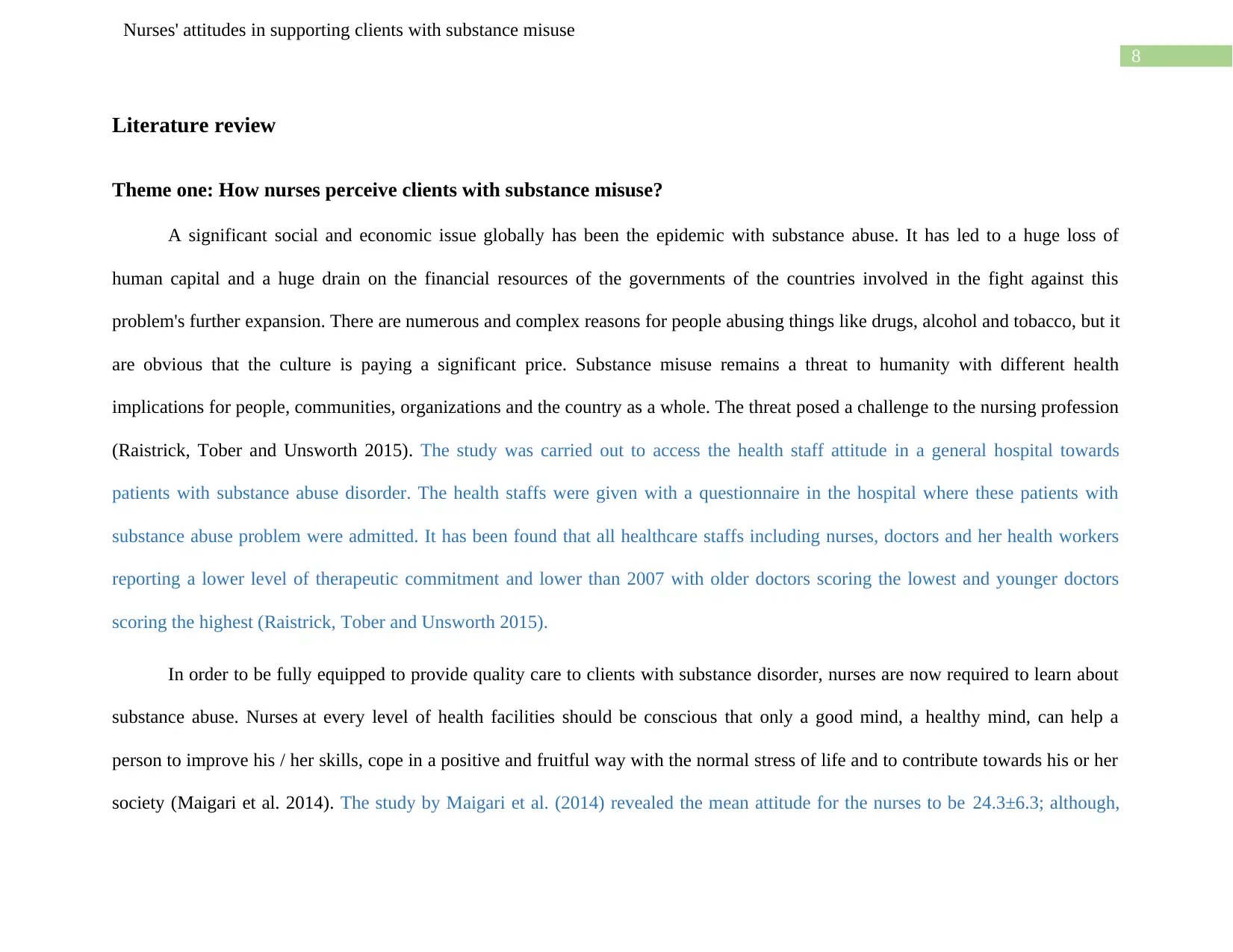
8
Nurses' attitudes in supporting clients with substance misuse
Literature review
Theme one: How nurses perceive clients with substance misuse?
A significant social and economic issue globally has been the epidemic with substance abuse. It has led to a huge loss of
human capital and a huge drain on the financial resources of the governments of the countries involved in the fight against this
problem's further expansion. There are numerous and complex reasons for people abusing things like drugs, alcohol and tobacco, but it
are obvious that the culture is paying a significant price. Substance misuse remains a threat to humanity with different health
implications for people, communities, organizations and the country as a whole. The threat posed a challenge to the nursing profession
(Raistrick, Tober and Unsworth 2015). The study was carried out to access the health staff attitude in a general hospital towards
patients with substance abuse disorder. The health staffs were given with a questionnaire in the hospital where these patients with
substance abuse problem were admitted. It has been found that all healthcare staffs including nurses, doctors and her health workers
reporting a lower level of therapeutic commitment and lower than 2007 with older doctors scoring the lowest and younger doctors
scoring the highest (Raistrick, Tober and Unsworth 2015).
In order to be fully equipped to provide quality care to clients with substance disorder, nurses are now required to learn about
substance abuse. Nurses at every level of health facilities should be conscious that only a good mind, a healthy mind, can help a
person to improve his / her skills, cope in a positive and fruitful way with the normal stress of life and to contribute towards his or her
society (Maigari et al. 2014). The study by Maigari et al. (2014) revealed the mean attitude for the nurses to be 24.3±6.3; although,
Nurses' attitudes in supporting clients with substance misuse
Literature review
Theme one: How nurses perceive clients with substance misuse?
A significant social and economic issue globally has been the epidemic with substance abuse. It has led to a huge loss of
human capital and a huge drain on the financial resources of the governments of the countries involved in the fight against this
problem's further expansion. There are numerous and complex reasons for people abusing things like drugs, alcohol and tobacco, but it
are obvious that the culture is paying a significant price. Substance misuse remains a threat to humanity with different health
implications for people, communities, organizations and the country as a whole. The threat posed a challenge to the nursing profession
(Raistrick, Tober and Unsworth 2015). The study was carried out to access the health staff attitude in a general hospital towards
patients with substance abuse disorder. The health staffs were given with a questionnaire in the hospital where these patients with
substance abuse problem were admitted. It has been found that all healthcare staffs including nurses, doctors and her health workers
reporting a lower level of therapeutic commitment and lower than 2007 with older doctors scoring the lowest and younger doctors
scoring the highest (Raistrick, Tober and Unsworth 2015).
In order to be fully equipped to provide quality care to clients with substance disorder, nurses are now required to learn about
substance abuse. Nurses at every level of health facilities should be conscious that only a good mind, a healthy mind, can help a
person to improve his / her skills, cope in a positive and fruitful way with the normal stress of life and to contribute towards his or her
society (Maigari et al. 2014). The study by Maigari et al. (2014) revealed the mean attitude for the nurses to be 24.3±6.3; although,
⊘ This is a preview!⊘
Do you want full access?
Subscribe today to unlock all pages.

Trusted by 1+ million students worldwide
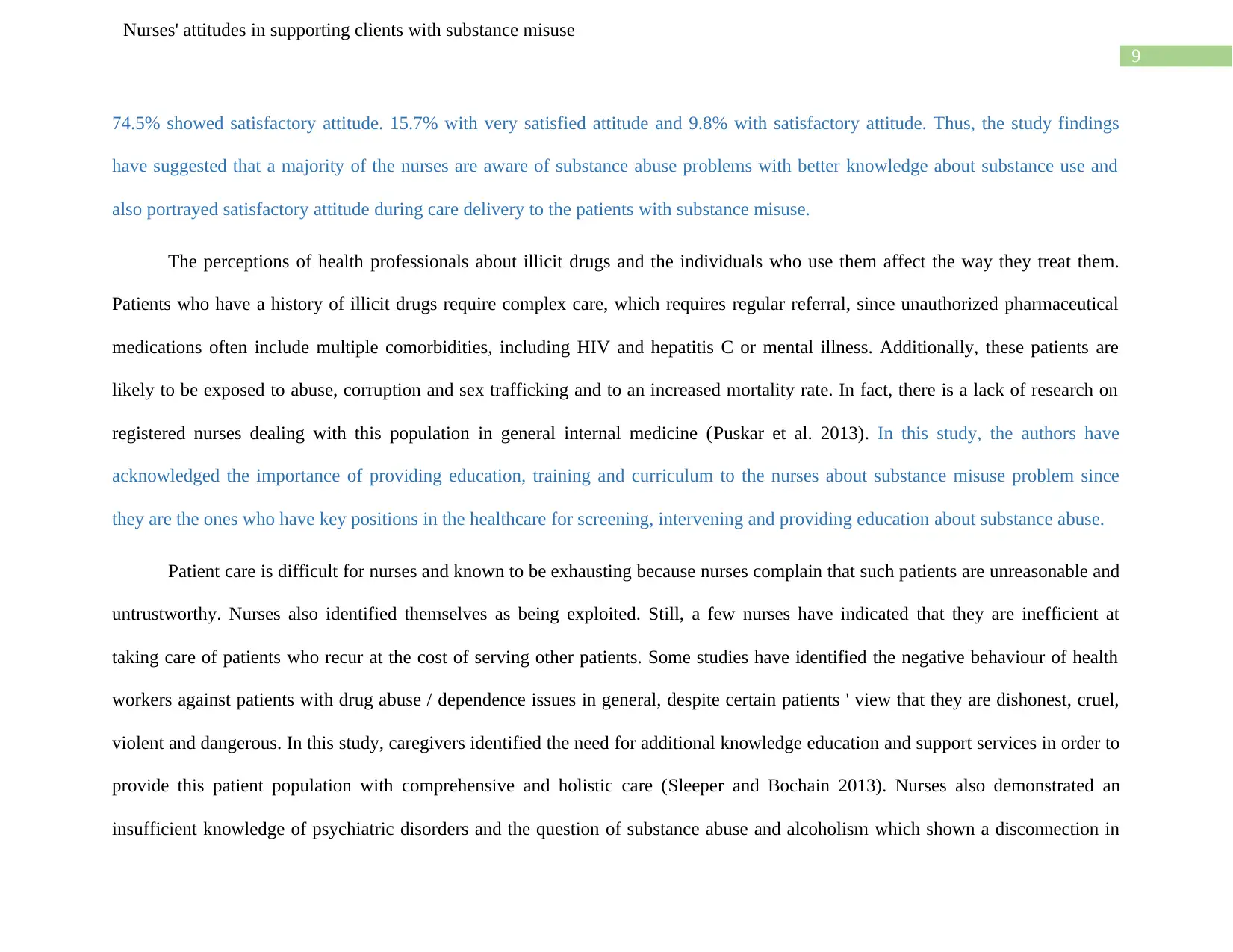
9
Nurses' attitudes in supporting clients with substance misuse
74.5% showed satisfactory attitude. 15.7% with very satisfied attitude and 9.8% with satisfactory attitude. Thus, the study findings
have suggested that a majority of the nurses are aware of substance abuse problems with better knowledge about substance use and
also portrayed satisfactory attitude during care delivery to the patients with substance misuse.
The perceptions of health professionals about illicit drugs and the individuals who use them affect the way they treat them.
Patients who have a history of illicit drugs require complex care, which requires regular referral, since unauthorized pharmaceutical
medications often include multiple comorbidities, including HIV and hepatitis C or mental illness. Additionally, these patients are
likely to be exposed to abuse, corruption and sex trafficking and to an increased mortality rate. In fact, there is a lack of research on
registered nurses dealing with this population in general internal medicine (Puskar et al. 2013). In this study, the authors have
acknowledged the importance of providing education, training and curriculum to the nurses about substance misuse problem since
they are the ones who have key positions in the healthcare for screening, intervening and providing education about substance abuse.
Patient care is difficult for nurses and known to be exhausting because nurses complain that such patients are unreasonable and
untrustworthy. Nurses also identified themselves as being exploited. Still, a few nurses have indicated that they are inefficient at
taking care of patients who recur at the cost of serving other patients. Some studies have identified the negative behaviour of health
workers against patients with drug abuse / dependence issues in general, despite certain patients ' view that they are dishonest, cruel,
violent and dangerous. In this study, caregivers identified the need for additional knowledge education and support services in order to
provide this patient population with comprehensive and holistic care (Sleeper and Bochain 2013). Nurses also demonstrated an
insufficient knowledge of psychiatric disorders and the question of substance abuse and alcoholism which shown a disconnection in
Nurses' attitudes in supporting clients with substance misuse
74.5% showed satisfactory attitude. 15.7% with very satisfied attitude and 9.8% with satisfactory attitude. Thus, the study findings
have suggested that a majority of the nurses are aware of substance abuse problems with better knowledge about substance use and
also portrayed satisfactory attitude during care delivery to the patients with substance misuse.
The perceptions of health professionals about illicit drugs and the individuals who use them affect the way they treat them.
Patients who have a history of illicit drugs require complex care, which requires regular referral, since unauthorized pharmaceutical
medications often include multiple comorbidities, including HIV and hepatitis C or mental illness. Additionally, these patients are
likely to be exposed to abuse, corruption and sex trafficking and to an increased mortality rate. In fact, there is a lack of research on
registered nurses dealing with this population in general internal medicine (Puskar et al. 2013). In this study, the authors have
acknowledged the importance of providing education, training and curriculum to the nurses about substance misuse problem since
they are the ones who have key positions in the healthcare for screening, intervening and providing education about substance abuse.
Patient care is difficult for nurses and known to be exhausting because nurses complain that such patients are unreasonable and
untrustworthy. Nurses also identified themselves as being exploited. Still, a few nurses have indicated that they are inefficient at
taking care of patients who recur at the cost of serving other patients. Some studies have identified the negative behaviour of health
workers against patients with drug abuse / dependence issues in general, despite certain patients ' view that they are dishonest, cruel,
violent and dangerous. In this study, caregivers identified the need for additional knowledge education and support services in order to
provide this patient population with comprehensive and holistic care (Sleeper and Bochain 2013). Nurses also demonstrated an
insufficient knowledge of psychiatric disorders and the question of substance abuse and alcoholism which shown a disconnection in
Paraphrase This Document
Need a fresh take? Get an instant paraphrase of this document with our AI Paraphraser
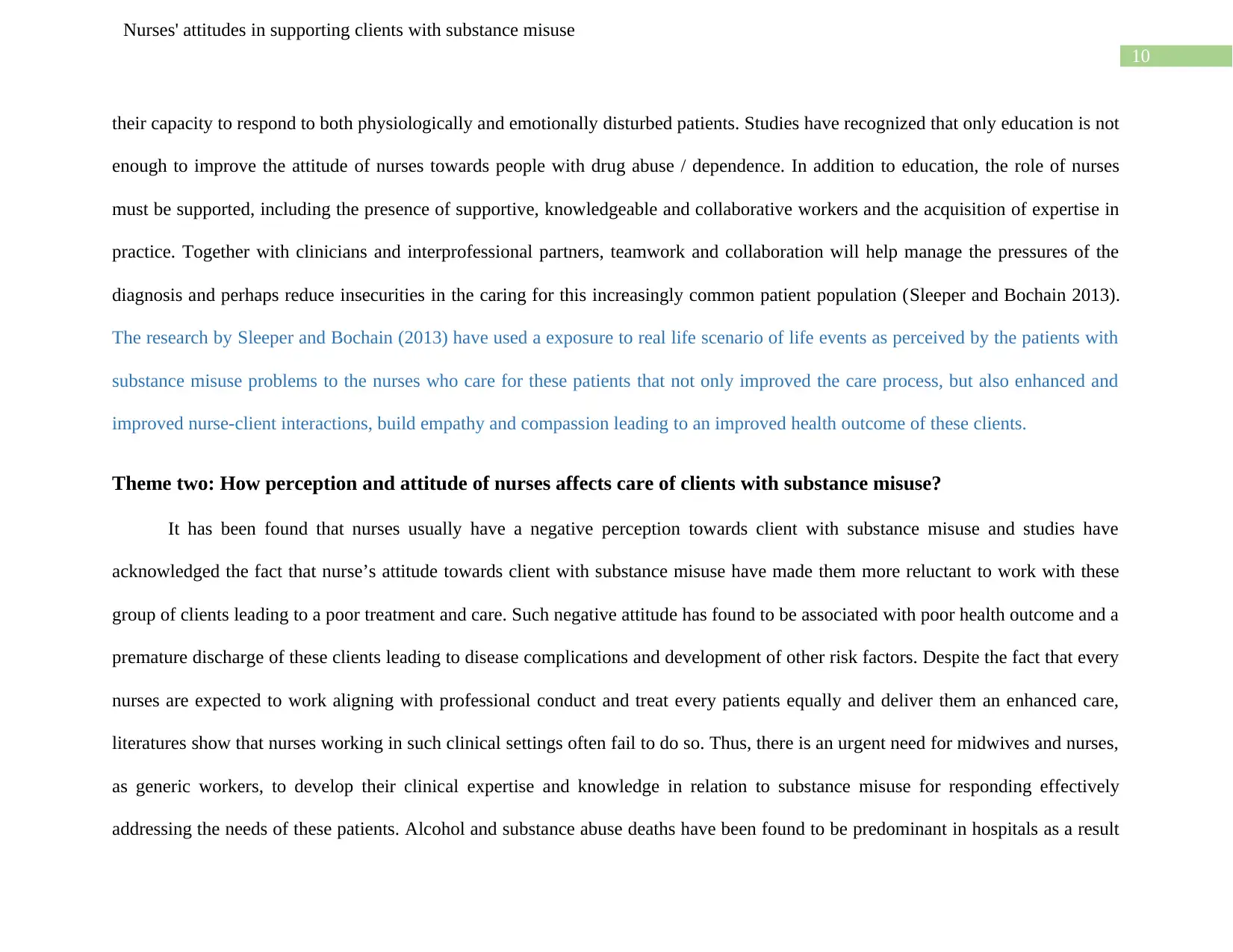
10
Nurses' attitudes in supporting clients with substance misuse
their capacity to respond to both physiologically and emotionally disturbed patients. Studies have recognized that only education is not
enough to improve the attitude of nurses towards people with drug abuse / dependence. In addition to education, the role of nurses
must be supported, including the presence of supportive, knowledgeable and collaborative workers and the acquisition of expertise in
practice. Together with clinicians and interprofessional partners, teamwork and collaboration will help manage the pressures of the
diagnosis and perhaps reduce insecurities in the caring for this increasingly common patient population (Sleeper and Bochain 2013).
The research by Sleeper and Bochain (2013) have used a exposure to real life scenario of life events as perceived by the patients with
substance misuse problems to the nurses who care for these patients that not only improved the care process, but also enhanced and
improved nurse-client interactions, build empathy and compassion leading to an improved health outcome of these clients.
Theme two: How perception and attitude of nurses affects care of clients with substance misuse?
It has been found that nurses usually have a negative perception towards client with substance misuse and studies have
acknowledged the fact that nurse’s attitude towards client with substance misuse have made them more reluctant to work with these
group of clients leading to a poor treatment and care. Such negative attitude has found to be associated with poor health outcome and a
premature discharge of these clients leading to disease complications and development of other risk factors. Despite the fact that every
nurses are expected to work aligning with professional conduct and treat every patients equally and deliver them an enhanced care,
literatures show that nurses working in such clinical settings often fail to do so. Thus, there is an urgent need for midwives and nurses,
as generic workers, to develop their clinical expertise and knowledge in relation to substance misuse for responding effectively
addressing the needs of these patients. Alcohol and substance abuse deaths have been found to be predominant in hospitals as a result
Nurses' attitudes in supporting clients with substance misuse
their capacity to respond to both physiologically and emotionally disturbed patients. Studies have recognized that only education is not
enough to improve the attitude of nurses towards people with drug abuse / dependence. In addition to education, the role of nurses
must be supported, including the presence of supportive, knowledgeable and collaborative workers and the acquisition of expertise in
practice. Together with clinicians and interprofessional partners, teamwork and collaboration will help manage the pressures of the
diagnosis and perhaps reduce insecurities in the caring for this increasingly common patient population (Sleeper and Bochain 2013).
The research by Sleeper and Bochain (2013) have used a exposure to real life scenario of life events as perceived by the patients with
substance misuse problems to the nurses who care for these patients that not only improved the care process, but also enhanced and
improved nurse-client interactions, build empathy and compassion leading to an improved health outcome of these clients.
Theme two: How perception and attitude of nurses affects care of clients with substance misuse?
It has been found that nurses usually have a negative perception towards client with substance misuse and studies have
acknowledged the fact that nurse’s attitude towards client with substance misuse have made them more reluctant to work with these
group of clients leading to a poor treatment and care. Such negative attitude has found to be associated with poor health outcome and a
premature discharge of these clients leading to disease complications and development of other risk factors. Despite the fact that every
nurses are expected to work aligning with professional conduct and treat every patients equally and deliver them an enhanced care,
literatures show that nurses working in such clinical settings often fail to do so. Thus, there is an urgent need for midwives and nurses,
as generic workers, to develop their clinical expertise and knowledge in relation to substance misuse for responding effectively
addressing the needs of these patients. Alcohol and substance abuse deaths have been found to be predominant in hospitals as a result
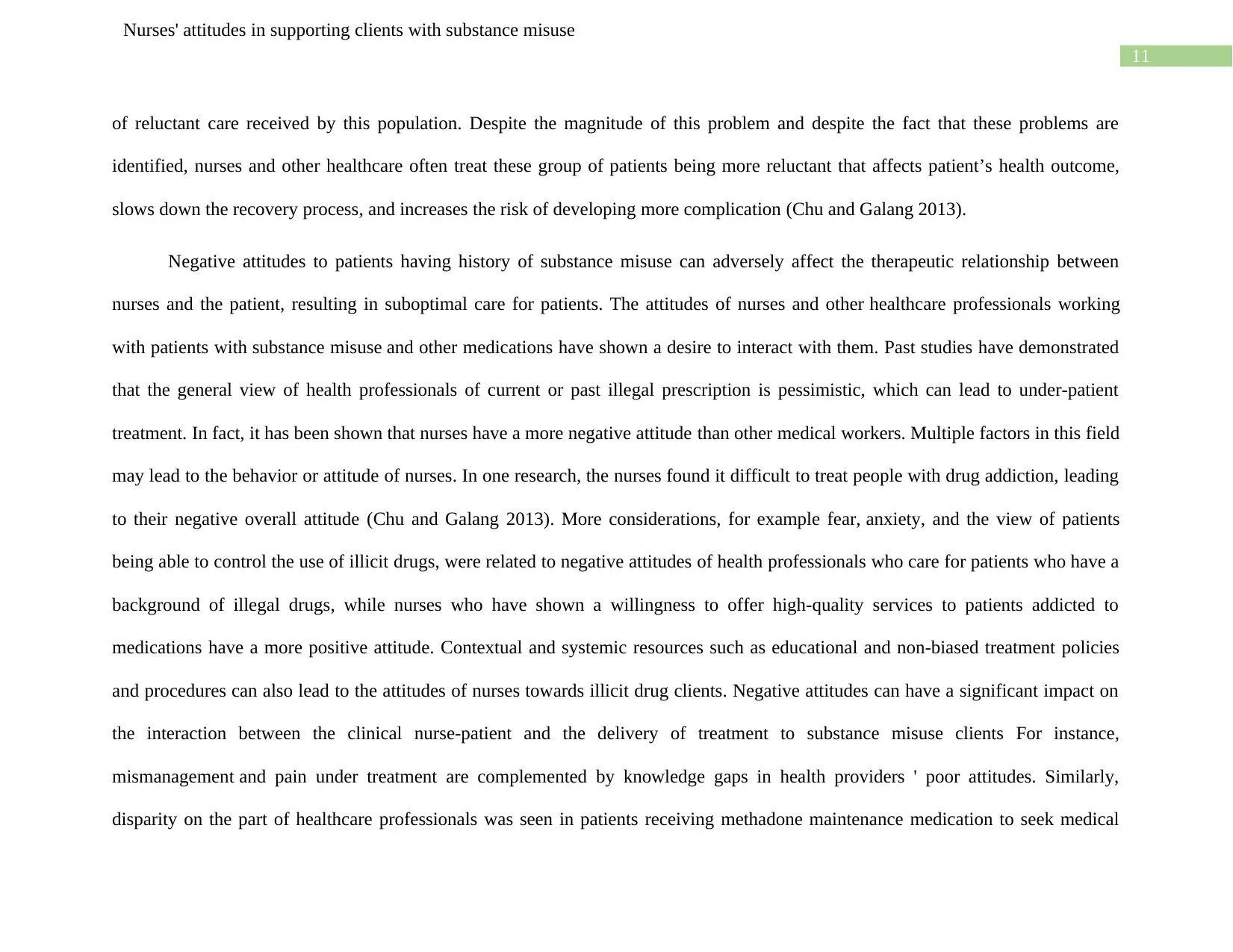
11
Nurses' attitudes in supporting clients with substance misuse
of reluctant care received by this population. Despite the magnitude of this problem and despite the fact that these problems are
identified, nurses and other healthcare often treat these group of patients being more reluctant that affects patient’s health outcome,
slows down the recovery process, and increases the risk of developing more complication (Chu and Galang 2013).
Negative attitudes to patients having history of substance misuse can adversely affect the therapeutic relationship between
nurses and the patient, resulting in suboptimal care for patients. The attitudes of nurses and other healthcare professionals working
with patients with substance misuse and other medications have shown a desire to interact with them. Past studies have demonstrated
that the general view of health professionals of current or past illegal prescription is pessimistic, which can lead to under-patient
treatment. In fact, it has been shown that nurses have a more negative attitude than other medical workers. Multiple factors in this field
may lead to the behavior or attitude of nurses. In one research, the nurses found it difficult to treat people with drug addiction, leading
to their negative overall attitude (Chu and Galang 2013). More considerations, for example fear, anxiety, and the view of patients
being able to control the use of illicit drugs, were related to negative attitudes of health professionals who care for patients who have a
background of illegal drugs, while nurses who have shown a willingness to offer high-quality services to patients addicted to
medications have a more positive attitude. Contextual and systemic resources such as educational and non-biased treatment policies
and procedures can also lead to the attitudes of nurses towards illicit drug clients. Negative attitudes can have a significant impact on
the interaction between the clinical nurse-patient and the delivery of treatment to substance misuse clients For instance,
mismanagement and pain under treatment are complemented by knowledge gaps in health providers ' poor attitudes. Similarly,
disparity on the part of healthcare professionals was seen in patients receiving methadone maintenance medication to seek medical
Nurses' attitudes in supporting clients with substance misuse
of reluctant care received by this population. Despite the magnitude of this problem and despite the fact that these problems are
identified, nurses and other healthcare often treat these group of patients being more reluctant that affects patient’s health outcome,
slows down the recovery process, and increases the risk of developing more complication (Chu and Galang 2013).
Negative attitudes to patients having history of substance misuse can adversely affect the therapeutic relationship between
nurses and the patient, resulting in suboptimal care for patients. The attitudes of nurses and other healthcare professionals working
with patients with substance misuse and other medications have shown a desire to interact with them. Past studies have demonstrated
that the general view of health professionals of current or past illegal prescription is pessimistic, which can lead to under-patient
treatment. In fact, it has been shown that nurses have a more negative attitude than other medical workers. Multiple factors in this field
may lead to the behavior or attitude of nurses. In one research, the nurses found it difficult to treat people with drug addiction, leading
to their negative overall attitude (Chu and Galang 2013). More considerations, for example fear, anxiety, and the view of patients
being able to control the use of illicit drugs, were related to negative attitudes of health professionals who care for patients who have a
background of illegal drugs, while nurses who have shown a willingness to offer high-quality services to patients addicted to
medications have a more positive attitude. Contextual and systemic resources such as educational and non-biased treatment policies
and procedures can also lead to the attitudes of nurses towards illicit drug clients. Negative attitudes can have a significant impact on
the interaction between the clinical nurse-patient and the delivery of treatment to substance misuse clients For instance,
mismanagement and pain under treatment are complemented by knowledge gaps in health providers ' poor attitudes. Similarly,
disparity on the part of healthcare professionals was seen in patients receiving methadone maintenance medication to seek medical
⊘ This is a preview!⊘
Do you want full access?
Subscribe today to unlock all pages.

Trusted by 1+ million students worldwide
1 out of 33
Related Documents
Your All-in-One AI-Powered Toolkit for Academic Success.
+13062052269
info@desklib.com
Available 24*7 on WhatsApp / Email
![[object Object]](/_next/static/media/star-bottom.7253800d.svg)
Unlock your academic potential
Copyright © 2020–2026 A2Z Services. All Rights Reserved. Developed and managed by ZUCOL.





